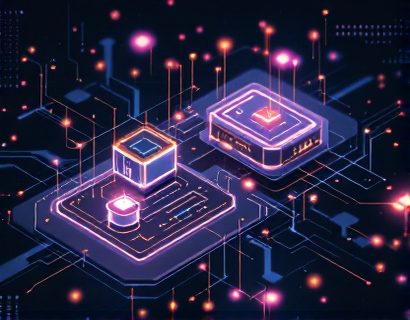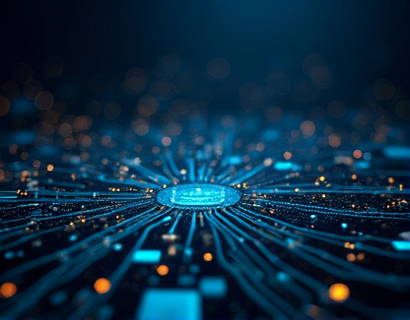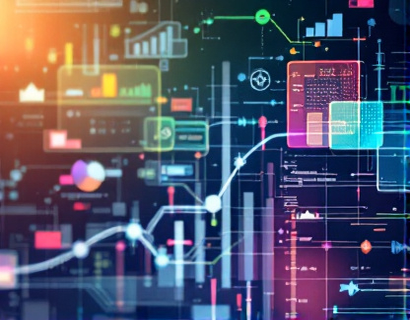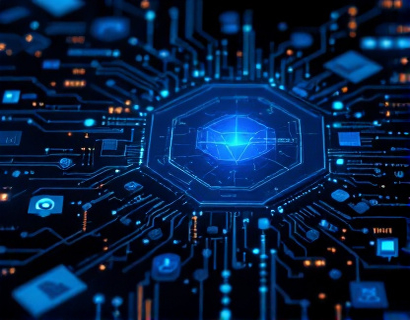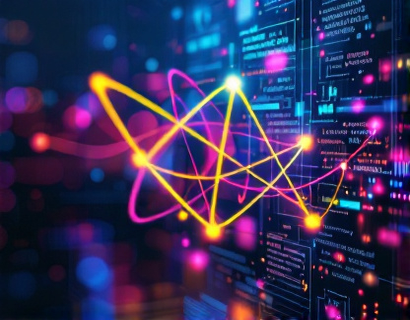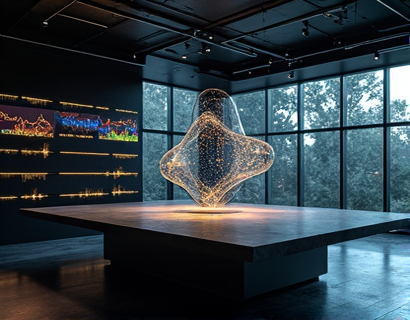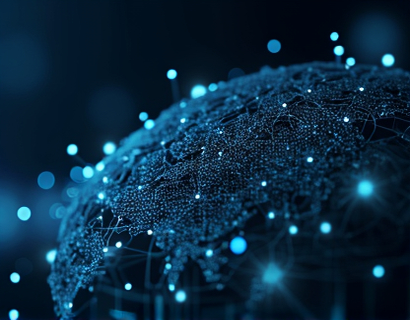Crypto-Driven AI Innovations: Transforming Digital Engagement Through Advanced Tech Solutions
The intersection of blockchain technology and artificial intelligence (AI) is giving rise to groundbreaking innovations that are revolutionizing digital engagement. This article delves into the transformative power of integrating these two cutting-edge technologies, exploring how they are redefining user experiences and creating new paradigms for interaction in the digital realm. Whether you are a tech enthusiast, an early adopter, or simply curious about the future of technology, this exploration will provide valuable insights into the advancements shaping our online world.
Understanding the Synergy Between Blockchain and AI
To fully appreciate the impact of crypto-driven AI innovations, it's essential to understand the fundamental principles of both blockchain and AI. Blockchain technology, known for its role in cryptocurrencies, is a decentralized ledger that ensures transparency, security, and immutability. It operates on a network of nodes, each maintaining a copy of the ledger, which is updated through consensus mechanisms.
Artificial intelligence, on the other hand, involves the simulation of human intelligence processes by machines, particularly computer systems. These processes include learning (the acquisition of information and rules for using it), reasoning (using rules to reach approximate or definite conclusions), and self-correction. When combined, blockchain and AI create a powerful synergy that enhances the capabilities of both technologies.
Enhanced Security and Trust
One of the most significant benefits of integrating blockchain and AI is the enhancement of security and trust in digital interactions. Blockchain's inherent properties make it an ideal foundation for AI systems that require robust security measures. For instance, AI models can be deployed on a blockchain to ensure that the data they process is tamper-proof and verifiable. This is particularly crucial in industries such as finance, healthcare, and supply chain management, where data integrity is paramount.
Smart contracts, self-executing contracts with the terms directly written into code, can be programmed to trigger AI functions based on predefined conditions. This ensures that AI operations are transparent and auditable, reducing the risk of fraud and increasing user trust. For example, in a supply chain scenario, an AI system can monitor and verify the authenticity of products, with each step recorded on the blockchain, providing an immutable record.
Personalized User Experiences
AI's strength lies in its ability to analyze vast amounts of data to deliver personalized experiences. When combined with blockchain, this capability is further enhanced by ensuring that user data is securely and privately managed. Blockchain can serve as a decentralized data storage solution, allowing users to maintain control over their personal information while enabling AI systems to access and process it efficiently.
For instance, in the realm of content recommendation, an AI system can leverage blockchain to store user preferences and viewing history in a secure and transparent manner. This data can then be used to provide highly personalized content suggestions without compromising user privacy. The decentralized nature of blockchain ensures that user data is not centralized in a single point of failure, reducing the risk of data breaches.
Decentralized AI Marketplaces
Another innovative application of blockchain and AI is the creation of decentralized AI marketplaces. These platforms allow developers and businesses to buy, sell, and trade AI models and data sets in a secure and transparent environment. Blockchain ensures that transactions are secure, and smart contracts automate the process, reducing the need for intermediaries and lowering costs.
In such marketplaces, AI models can be tokenized, allowing for fractional ownership and easier monetization. This democratizes access to advanced AI technologies, enabling smaller entities to leverage powerful AI solutions without the need for significant upfront investments. For example, a startup can purchase a fraction of a high-performance AI model to enhance its product offerings, all facilitated through a blockchain-based platform.
Improved Data Privacy and Consent Management
Data privacy has become a major concern in the digital age, and the integration of blockchain and AI offers a promising solution. Blockchain can be used to create decentralized identity management systems, where users have full control over their personal data. AI can then be employed to manage consent and ensure that data usage complies with user preferences and regulatory requirements.
For instance, a user can grant permission for a specific AI application to access certain aspects of their data for a limited time, with the entire process recorded on the blockchain. This not only enhances privacy but also builds trust, as users can verify and audit data access and usage. This approach aligns with regulations like the General Data Protection Regulation (GDPR), making it easier for businesses to operate in a compliant manner.
Enhanced Fraud Detection and Prevention
Fraud is a persistent issue in various industries, and the combination of blockchain and AI can significantly improve fraud detection and prevention mechanisms. AI algorithms can analyze patterns and anomalies in real-time data, while blockchain provides a secure and transparent record of transactions and interactions.
In the financial sector, for example, AI can monitor transactions for suspicious activities and flag potential fraud cases. These flagged cases can be stored on the blockchain, creating an immutable audit trail. This not only helps in immediate detection and response but also provides a historical record for regulatory compliance and forensic analysis. The decentralized nature of blockchain ensures that no single entity can manipulate the data, enhancing the overall integrity of the system.
Optimized Supply Chain Management
Supply chain management is another area where the integration of blockchain and AI can drive significant improvements. AI can optimize various aspects of the supply chain, from demand forecasting to inventory management, while blockchain ensures transparency and traceability.
For instance, AI can predict demand based on historical data, market trends, and other factors, and blockchain can verify the authenticity and origin of products at each stage of the supply chain. This combination ensures that products are genuine, reducing the risk of counterfeiting, and provides real-time visibility into the supply chain process. Blockchain's immutable ledger ensures that all transactions and status updates are recorded and verifiable, enhancing trust among all stakeholders.
Challenges and Considerations
While the potential of crypto-driven AI innovations is vast, there are several challenges and considerations that need to be addressed. One of the primary challenges is the technical complexity involved in integrating these technologies. Developers and organizations must have a deep understanding of both blockchain and AI to implement solutions effectively.
Another consideration is the regulatory landscape. As these technologies are relatively new, regulations are still evolving. Ensuring compliance with existing laws and anticipating future regulations is crucial. Additionally, there are concerns around scalability and performance, particularly for blockchain networks that may struggle with high transaction volumes.
Privacy and security remain top priorities, as the combination of blockchain and AI involves handling sensitive data. It is essential to implement robust security measures and adhere to best practices to protect user information. Finally, the energy consumption associated with blockchain, particularly proof-of-work mechanisms, is a growing concern that needs to be addressed to make these solutions more sustainable.
Future Prospects
The future of crypto-driven AI innovations is promising, with ongoing research and development poised to unlock new possibilities. As blockchain technology matures and becomes more scalable, the integration with AI will become more seamless and efficient. The rise of decentralized finance (DeFi) and non-fungible tokens (NFTs) is already demonstrating the potential of combining these technologies.
In the realm of AI, advancements in machine learning and quantum computing will further enhance the capabilities of AI systems. When paired with blockchain, these advancements can lead to more powerful and secure AI applications. The potential for decentralized AI models that can operate independently and collaboratively across a blockchain network is an exciting area of exploration.
Moreover, the increasing adoption of edge computing will complement the integration of blockchain and AI by enabling faster data processing and reducing latency. This will be particularly beneficial for real-time applications such as autonomous vehicles and smart cities, where immediate decision-making is crucial.
In conclusion, the integration of blockchain and AI is transforming digital engagement by enhancing security, personalization, and transparency. As these technologies continue to evolve, they will play a pivotal role in shaping the future of the digital landscape, offering innovative solutions that meet the growing demands of tech enthusiasts and early adopters.



